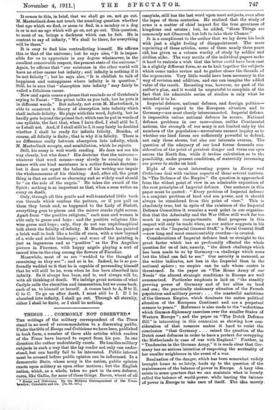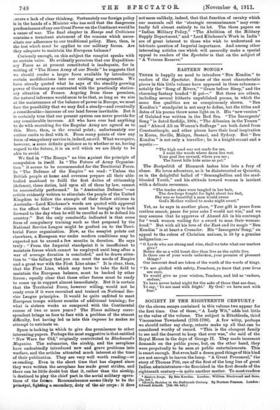THINGS . . . COMMONLY NOT OBSERVED.* THE writings of
the military correspondent of the Times stand in no need of recommendation to a discerning public. Under the title of Essays and Criticisms we have here, published in book form, a number of these able articles which readers of the Times have learned to expect from his pen. In one direction the author undoubtedly excels. He handles military subjects in such a way that the lay reader not only can under- stand, but can hardly fail to be interested. Public interest must be aroused before public opinion can be influenced. In a democratic State, whose army is the nation, public opinion reacts upon military as upon other matters ; but the English nation, which, as a whole, takes no part in its own defence, cares, like Gallio, for none of these things. Bacon, wisest of all • Essays and Criticisms. By the Military Correspondent of the Times. Trevidon: Constable and Co. [7s. 6d. net.]
essayists, still has the last word upon most subjects, even after the lapse of three centuries. He realized that the study of arms is a matter of chief import for the true greatness of kingdoms and estates ; but, he added, "these Things are commonly not Observed, but left to take their Chance."
It is a compliment to the author that we lay down his book with just a. alight feeling of disappointment. The mere reprinting of these articles, some of them nearly three years old, has given us a volume worthy of study by soldier and civilian alike. The very merits of the individual papers make
it hard to restrain a wish that the latter could have been cast in a slightly different form, so as to knit together the subjects
which come under review and to gather closer the threads of the arguments. Very little would have been necessary in the way of revision and addition, and one can imagine the added value of the result. Recasting was, however, no part of the author's plan, and it would be ungrateful to complain of the fact that his admirable series of studies is only what he intended it to be.
Imperial defence, national defence, and foreign politics— with especial regard to the European situation and to Germany—are most closely interconnected. Imperial defence is impossible unless national defence be secure. National defence problems in our case—since, unlike Continental nations, the strength of our army is not limited only by the numbers of the population—necessitate earnest inquiry as to whether our land forces are sufficiently powerful to defend, not only these shores, but also our interests oversea. The question of the adequacy of our land forces demands con- sideration of the point of greatest danger and turns our eyes across the North Sea, while it invites calculation as to the possibility, under present conditions, of materially increasing our power to strike on land.
Eight of the most interesting papers in Essays and Criticisms deal with various aspects of these several matters.
In "The Defence of the Empire" ttie question is approached from the widest point of view in an admirable exposition of the root principles of Imperial defence. One sentence in this paper must be quoted : "Every problem of Imperial defence is a conjoint problem of land and sea power, and it should always be considered from this point of view." This is absolutely true, but in spite of the existence of the Imperial Defence Committee it remains a weak point in our organiza- tion that the Admiralty and the War Office still work far too
much in separate compartments. Real progress in this respect will only be made when, as our author suggests in his paper on the "Imperial General Staff," a Naval General Staff —now long and most unaccountably overdue—is created.
Considerations of Imperial defence lead us straight to the great factor which has so profoundly affected the whole question for us of late, namely, " the direct challenge which has been made to us by Germany—a challenge which none but the blind can fail to see." Our security is menaced, as the writer indicates, not less in the Imperial than in the national sphere ; no empire can be safe whose centre is threatened. In the paper on "The Home Army of our Needs" the altered strategic conditions in Europe are well summarized. Particular emphasis is laid on "the steadily growing power of Germany and of her allies on land and sea ; the practically stationary situation of the French
population and military power ; . . . the masterful ambitions of the German Empire, which dominate the entire political situation of the European Continent and are a perpetual menace to peace." Reference is also made to the "seductions which German diplomacy exercises over the smaller States of Western Europe " ; and the paper on "The Dutch Defence Bill" is interesting in this connexion as showing how con- sideration of that measure makes it hard to resist the conclusion " that Germany . . . raised the question of the Dutch coast defences in order to have a pretext for occupying the Netherlands in case of war with England." Further, in " Tendencies in the German Army," it is made clear that Ger- many has no serious intention of respecting the neutrality of her smaller neighbours in the event of a war.
Realization of the danger, which has been somewhat rudely brought home to us lately, leads up to the question of the maintenance of the balance of power in Europe. A hazy idea exists in some quarters that we can maintain what is loosely called the balance of world-power, while leaving the balance of power in Europe to take care of itself. The idea merely. ,rovers a lack of clear thinking. Fortunately our foreign policy is in the hands of a Minister who has said that the dangerous predominance of any one Great Power on the Continent would be a cause of war. The final chapter in Essays and Criticisms contains a trenchant statement of the reasons which neces- sitate our adherence to our traditional policy. Here, then, is the test which must be applied to our military forces. Are they adequate to maintain the European balance ?
Curiously enough, on this subject the essayist speaks with no certain voice. He evidently perceives that our Expedition- ary Force as at present constituted is inadequate, for in writing of " The Home Army of our Needs " he suggests that we should render a larger force available by introducing certain modifications into our existing arrangements. We have already quoted what he says of the steadily growing power of Germany as contrasted with the practically station- ary situation of France. Arguing from these premises, the natural inference would seem to be that, so long as we aim at the maintenance of the balance of power in Europe, we must face the possibility that we may find a steady—and eventually a considerable—increase of our land forces inevitable. But it is certainly true that our present system can never provide for any considerable increase. All who have ever had anything to do with recruiting for the Regular Army are agreed as to this. Here, then, is the crucial point ; unfortunately our author omits to deal with it. From many points of view any form of compulsory service is, indeed, an evil. What we require, however, as more definite guidance as to whether or no, having regard to the future, it is an evil which we are likely to be able to avoid.
We find in " The Essays " no bias against the principle of compulsion in itself. In " The Future of Army Organiza- tion " it seems to be recommended for the Territorial Force. In " The Defence of the Empire " we read : " Unless the British people at home and overseas prepare all their able- bodied manhood to fulfil the first duties of citizenship (defence), these duties, laid upon all of them by law, cannot be successfully performed." In "Australian Defence "—an article evidently written to stimulate the people of the United Kingdom to follow the example of their fellow citizens in Australia—Lord Kitchener's words are quoted with approval to the effect that "the citizen must be brought: up to look forward to the day when he will be enrolled as fit to defend his country." But the only conclusikr indicated is that some form of compulsory training such as that proposed by the National Service League might be grafted on to the Terri- torial Force organization. Now, as the essayist points out elsewhere, a European war under modern conditions may be expected not to exceed a few months in duration. He says truly : " From the Imperial standpoint it is insufficient to maintain forces which cannot be employed until long after a war of average duration is concluded," and he draws atten- tion to " the fallacy that you can meet the needs of Empire and a great war with the First Line alone." It is clear, then, that the First Line, which may have to take the field to maintain the European balance, must be backed by other forces ; equally clear that these other forces must be ready to come up in support almost immediately. But it is certain that the Territorial Force, however willing, would not be ready even if it were recruited and trained on National Ser- vice League principles. It would be quite unfitted to meet European troops without months of additional training; for what is sixteen weeks as compared with the Continental course of two or more years ? The Times military corre- spondent brings us face to face with a problem of the utmost difficulty, but having led us into this impasse he makes no attempt to extricate us.
Space is lacking in which to give due prominence to other interesting papers. Perhaps the most suggestive is that entitled " New Wars for Old," originally contributed to Blackwood's Magazine. The submarine, the airship, and the aeroplane have undoubtedly introduced new and grave problems into warfare, and the articles attracted much interest at the time of their publication. They are very well worth reading—or re-reading. Even in the short time that has elapsed since they were written the aeroplane has made great strides, and there can be little doubt but that it, rather than the airship, is destined to play the chief part in the aerial military opera- tions of the future. Reconnaissance seems likely to be the principal, fighting a secondary, duty of the air corps : it does not seem unlikely, indeed, that that function of cavalry which our manuals call the "strategic reconnaissance" may even- tually fall almost entirely to its lot. The three papers on "Indian Military Policy," "The Abolition of the Military Supply Department," and " Lord Kitchener's Work in India " are of great interest to those who wish to understand an intricate question of Imperial importance. And among other interesting articles one which will assuredly make a special appeal to readers of the Spectator is that on the subject of " A Veteran Reserve."







































































 Previous page
Previous page